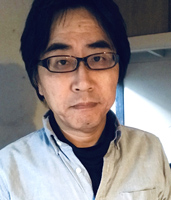“An era when AI “edits” novels” Akio Nakamata (writer/editor)

In the previous column, we talked about Rie Kudan’s ”Tokyo Compassion Tower,” an Akutagawa Prize-winning work that incorporates generative AI into its creation, and this is a continuation of that. There is a regional literary award called ”Agakita Novel Jam” sponsored by Keiwa Gakuen University in Shibata City, Niigata Prefecture. It is not just an open literary award, but is unique in that those who enter as writers form teams with designers and editors, work together to create a work from scratch, and publish it. I have been serving as the chairperson of this award’s judging committee since 2020.
This year, the fourth year of the event, the role of “editor,” for which participants had previously been recruited, was replaced by generative AI. Those who participate as “writers” can use the document production AI assistant “Xaris” developed by Studio Yurigraph, and utilize generative AI at various stages from planning and plot creation to writing and proofreading. and completed the work.
This award has a history of 16 years, counting from its predecessor, ”Agakita Romance Award.” Universities, businesses, and the government have been working together to support the regionally-oriented literary award for a long time, but the two years since the name and implementation method were changed to ”Agakita Novel Jam” have coincided with the coronavirus pandemic. It was originally planned to be an event where participants would have a training camp on site, but it was no longer possible to do so from the beginning. The management side has overcome this predicament by digital transformation, such as publishing e-books, collaborating on the web, and even proactively utilizing generation AI.
This year’s Grand Prix winning work was decided to be Yasuji Kashima’s ”Black Yokan”, and I went to Shibata City for the first time in a year to announce the winning works and commend the authors. There, I had the opportunity to talk with participants and organizers about the significance of this award.
”Tokyo Compassion Tower,” which won the Akutagawa Prize, became a hot topic not only for its theme of AI, but also for the fact that the author actually used generative AI in the writing process. One of the characteristics of this work is that it utilizes AI to essentially criticize its easy use, but it may be necessary to pause for a moment. After their debut, writers receive a variety of tangible and intangible support from editors at publishing companies. However, amateurs and creators living in rural areas do not receive such generous support.
The “interaction” with a generative AI may be essentially different from that of an actual editor. However, during the creative process, the author must have ”internal dialogue”. If the role of an ”editor” is to be a catalyst in that case, then ”dialogue” with generative AI could have a similar effect.
Creation support using generative AI has expanded from the illustration world, but it will also become active in the text field in the future. On the other hand, it is highly likely that human support will become difficult not only in fields such as nursing care, medical care, and education, but also in the creative world. To begin with, the current publishing industry is highly concentrated in Tokyo, and the presence of “editors” is particularly concentrated in Tokyo.
The significance of assigning the role of ”editor” to a generative AI for a local literary award should be considered in a different dimension from the upward trending AI boom.
